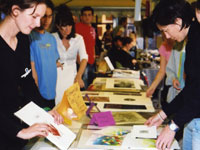Democracy and Authoritarianism in the 21st century - ARTS2851
Faculty: Faculty of Arts and Social Sciences
School: School of Social Sciences
Course Outline: School of Social Sciences
Campus: Sydney
Career: Undergraduate
Units of Credit: 6
EFTSL: 0.12500 (more info)
Indicative Contact Hours per Week: 3
Enrolment Requirements:
Prerequisite: 30 units of credit at Level 1
CSS Contribution Charge: 1 (more info)
Tuition Fee: See Tuition Fee Schedule
Further Information: See Class Timetable
Available for General Education: Yes (more info)
View course information for previous years.
Description
Subject Area: Politics and International Relations
What is democracy? Do we currently live in a democracy? Why is it that people around the world seem to want democracy, yet so few seem to be happy with the way it functions? Conversely, how would you recognize a dictator in today's world? Do autocracies sometimes perform better than democracies? How can we improve our political systems?
From the Occupy and Indignado movements, to the Colour Revolutions in Former Soviet Republics, to the Arab spring: all around the world citizens are protesting: some because they want more democracy, others because they want different democracy. Yet democracy is under pressure. Challenges such as the global economic crisis, climate change, and international migration increasingly question the capacity of democratic political systems to deal with complex problems. Moreover, processes such as globalization, the changing role and nature of the media, and the changing nature of political parties and citizen mobilization are fundamentally changing the way democracy works. On top of that, new forms of authoritarianism are developing: autocrats increasingly adopt the formal institutions of democracy, while corrupting their substance. As a consequence, many autocrats today are ‘democratically’ elected and claim to represent their people. How sustainable is democracy in the 21st century?
In this course we will further explore these questions comparing Australia to other democracies and non-democracies around the world. You will learn about the role of power, legitimacy, representation and accountability in making political systems work (or not). You will learn to identify the differences between democracies and autocracies, political institutions and actors, and when they lead to positive or negative outcomes. You will leave this course with a better understanding of the different political systems around the world and the global challenges facing democracy in the 21st century, as well as a basic research toolkit that allows you to develop ideas on how to improve democracy.










